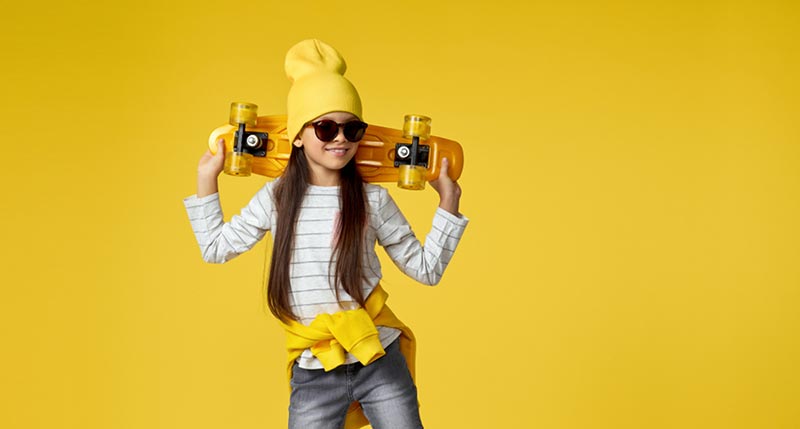If you’re a regular reader of our blog, you may already know that by the time your son or daughter reaches age 18, they’ve already received up to 80% of their entire lifetime’s worth of exposure to the sun’s damaging ultraviolet (UV) rays! It’s a shocking statistic.
That’s because kids spend so much time outside – which is healthy – but means parents must protect them from the damage that UV rays can cause to their developing eyes and tender skin. One game-changing advantage parents like you can provide their kids with is high-quality sunglasses that block 100% of the sun’s harmful UVA and UVB rays. And encourage them to wear their sunnies whenever they spend time outside. Yes, even on cloudy or overcast days.
But — how do you get your kids to wear their sunglasses? Here are five proven methods:
- Let Kids Choose Their Own Sunglasses
A little child psychology goes a long way: If you want your kids to wear sunglasses regularly (and you do!), simply allow them to choose their own sunnies. And why not make a big deal out of it? It’s a unique treat for a child to get to choose the frames that make their heart sing and express their budding fashion sense. Encourage them to pick the style, color, frame, and tint of their sunglasses, because what child doesn’t love the ability to be a little independent with their “look?”
- Beware of Cheap Sunglasses
Our optical department is well-stocked with high-quality kids’ sunglasses that offer 100% UV protection. Your eye health and the eye health of your kids are our No.1 priority. We want to ensure that the sunglasses you wear protect your eyes from harmful UV radiation.
As a precaution: Beware of cheap sunglasses at the dollar store – those heart and cat-shaped frames are very cute, but without regulation on the lenses the manufacturers use, it’s quite possible that those $2 “funglasses” don’t offer 100% UV protection.
Sunglasses without proper UV protection are particularly dangerous for kids. To explain why, it’s important to understand that the tint on a lens doesn’t indicate that it includes UV protection. Darker does not mean better where UV protection is concerned — we can put a 100% UV protection coating on a clear lens. Some dark lenses offer no UV protection.
If you remember just one fact from this article, let it be this: Sunglass lens tint does not indicate its level of UV protection.
Darker tints on sunglass lenses allow the pupils to open a bit wider. But if those dark sunglass lenses don’t offer UV protection, wider pupils will allow your eyes (or your kids’ eyes) to absorb even more damaging UV rays into the deep structures of the eye, where they can do long-term damage. Cumulative UV damage over a lifetime can contribute to your child developing cataracts, macular degeneration, or even cancer of the eye in adulthood.
That’s why it’s critical to provide your child with high-quality sunglasses that protect them from 100% of UVA and UVB rays in a style that they love and will wear every day.
- Keep An Eye on Comfort and Durability
It’s important that your child’s sunglasses are both comfortable and durable:
- Comfort is key because heavy or bulky sunglasses will make it an uphill battle when trying to get your child to wear them, so choose lightweight, impact-resistant eyewear. Our scratchproof polycarbonate lenses are one great option. You might also consider wraparound-style glasses that protect a larger portion of their face.
- Durability is necessary because – kids, right? Frames that flex and bend but don’t break are the best choice for active kids.
If your child participates in sports, choose a close-fitting frame that offers increased protection. Amber or green lenses can increase contrast, which can be a positive for young athletes.
- Model Good Behavior
It’s a smart strategy to set a good example by wearing your sunglasses consistently. Kids watch and emulate much of what their parents do. Most kids understand why it’s important to wear sunscreen on their skin, so have a discussion with them about protecting their eyes from the harmful rays of the sun.
When you wear your sunglasses — which we encourage you to do every time you go outside — make a verbal note of it if your kids are in earshot. Maybe say something like, “Now that I’ve applied sunscreen, I’m also going to put on my sunglasses so I can protect my eyes and look like a rockstar for our day at the park!” They might roll their eyes, but they’re listening — and they will likely do exactly what you do. (Because, after all, you’re their hero, and they want to be just like you!)
- Start Early
When should your child start to wear sunglasses? Experts say 6 months of age! And if your child needs prescription glasses, we can also fit them for prescription sunglasses.
Spring has sprung, and summer is coming up fast. If your child’s sunglasses are scratched, bent, or dollar-store-cheapies that may not offer full UV protection, come visit us today.
We’ll outfit your child with a pair of high-quality sunglasses that offer 100% UVA and UVB protection to protect their precious sense of vision now so they can continue to see their best for decades to come.

Recent Comments